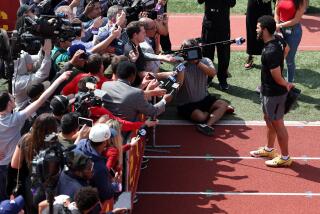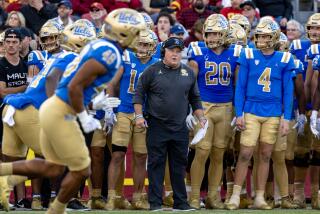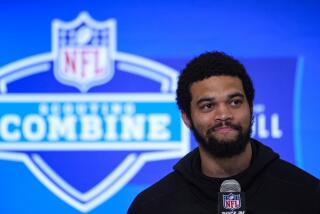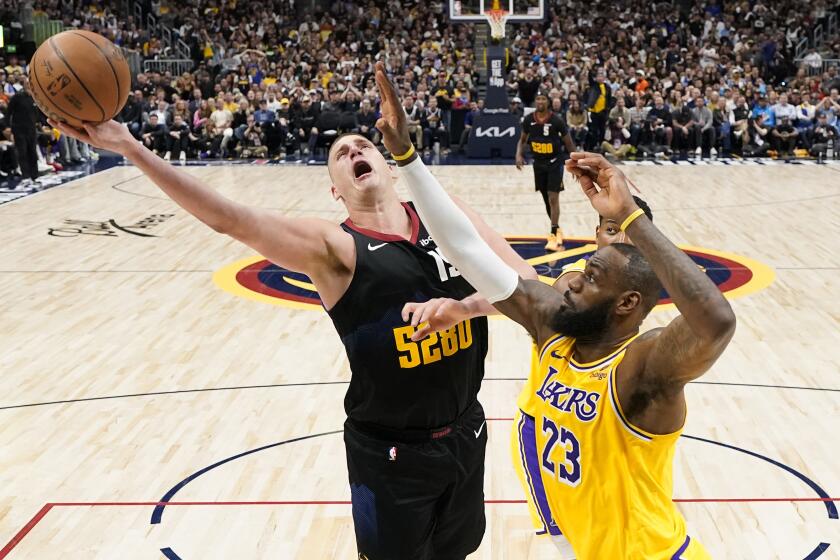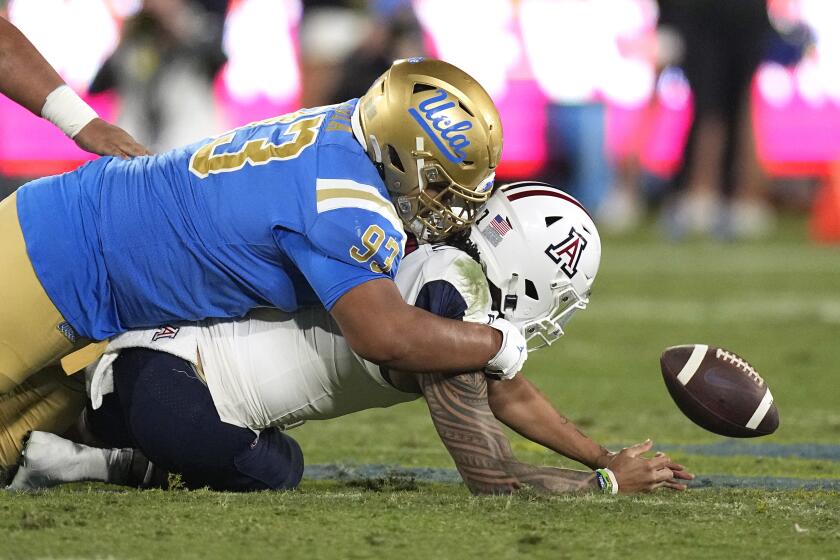Analysis:: Most of college football’s marquee attractions are playing in bowl season
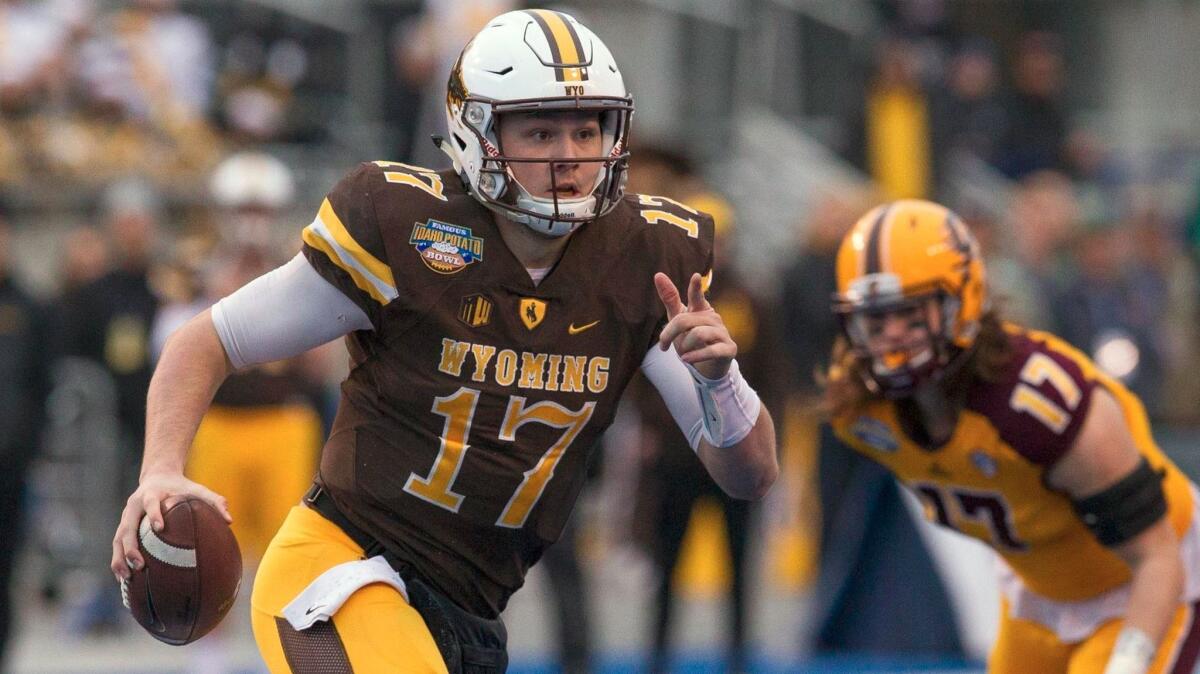
If anyone had a good reason to skip the bowl season, it was Josh Allen.
The Wyoming quarterback had been sidelined since mid-November with an injured shoulder. As a potential first-round pick in next spring’s NFL draft, he had little to gain from facing Central Michigan in the Famous Idaho Potato Bowl.
But Allen insists that he never considered sitting out.
“I’m not that type of guy,” he said. “I want to play.”
It was just last year that two of college football’s marquee names — Leonard Fournette and Christian McCaffrey — chose to forgo the postseason in favor of preparing for the draft.
The trend has continued this winter, but not to the extent many people had feared. Though some big-time juniors and seniors have left their teams, just as many have stuck around.
Bryce Love, the Heisman Trophy finalist who limped through much of the regular season with an ankle sprain, traveled to the Alamo Bowl with his Stanford teammates.
Quarterback Mason Rudolph is expected to start for Oklahoma State. Same goes for Penn State running back Saquon Barkley.
Even UCLA’s Josh Rosen, who failed to clear concussion protocol for the Cactus Bowl, practiced all week in hopes of taking the field.
“I mean, bowl games are fun,” Rosen said before the game. “I like going out there with the guys and you’re in another city for a week and you have a good time.”
When players treat the college game as a business, it strips away a little more of the traditional veneer, the quaint notion of playing for love of sport and school.
Not that it should be surprising in this era of massive broadcast dollars and exorbitant coaching salaries. The good times that Rosen mentioned carry a tangible risk for players headed to the next level.
The season before Fournette and McCaffrey decided to sit out, Notre Dame linebacker Jaylon Smith sustained torn knee ligaments in the Fiesta Bowl and slipped from a projected top-five pick to the second round of the NFL draft.
A year before that, Oregon cornerback Ifo Ekpre-Olomu didn’t even make it to the Rose Bowl, suffering an injured knee during practice. He fell all the way to the seventh round.
Fournette and McCaffrey stayed healthy and went in the first 10 picks. Smith and Ekpre-Olomu missed out on significant money with their first pro contracts.
Maybe that’s why current Oregon running back Royce Freeman, the school’s career rushing leader, decided to skip the Las Vegas Bowl two weeks ago. Coach Mario Cristobal said he “respected” the decision but added: “Do I want to see him play? Absolutely.”
Across the country, defensive back Derwin James left Florida State before the Independence Bowl, and Texas took the field without offensive lineman Connor Williams and safety DeShon Elliott, who opted out of the Texas Bowl on Wednesday.
“It was a very difficult decision that I put a lot of thought into,” Elliott said in a statement.
At Penn State, coach James Franklin said he appreciates that players face a choice: “I understand there’s a business aspect to this.” But he also said he doesn’t “really love the whole topic.”
It seems that Ohio State coach Urban Meyer is still coming to terms with the trend.
“I remember last year was the first time — and I really didn’t study it because I was, like, what’s going on here?” Meyer said.
As the Buckeyes prepared to play USC in the Cotton Bowl on Friday, quarterback J.T. Barrett said he would be “very shocked” if any of his teammates bailed early. The mere suggestion seemed to bother some Ohio State players.
“The love for the brother here, and brotherhood, that’s real,” linebacker Chris Worley said. “And another thing about it is, you’ve got a bunch of guys that love playing football.”
Stanford coach David Shaw expressed similar sentiments when discussing Love’s desire to persevere through weeks of a nagging injury and “excruciating pain.”
If nothing else, a month of bowl practice has allowed Love to recuperate.
“Hopefully, we get to see what we saw earlier in the season,” Shaw said. “Now, he hasn’t been slow by any stretch of the imagination, but he just hasn’t been 100% and there’s a difference.”
As for Love, he said he hopes a strong performance against Texas Christian on Thursday will raise his standing with NFL scouts.
“I mean, you have to put good things on tape,” he said.
It makes a difference that Stanford and Ohio State are playing in Power Five matchups against highly ranked opponents. Their games carry a lot more weight than, say, a bowl game played on a weekday before Christmas.
Wyoming’s Allen appeared to make the right decision even in the less-prestigious Potato Bowl.
With John Elway, the general manager of the Denver Broncos, in attendance, Allen passed for 154 yards and three touchdowns while leading his team to a 37-14 victory.
The junior subsequently announced that he would skip his final season of eligibility and enter the draft.
Wyoming coach Craig Bohl suggested that Allen’s insistence on showing up in Idaho — rather than watching from home — should be the norm.
“I think Josh’s decision to play his final game coming off an injury is what college football is all about,” Bohl said. “And some of the guys that make their decisions on choosing not to finish off their career … it would be pretty hard for me to understand that.”
Twitter: @LAtimesWharton
More to Read
Get our high school sports newsletter
Prep Rally is devoted to the SoCal high school sports experience, bringing you scores, stories and a behind-the-scenes look at what makes prep sports so popular.
You may occasionally receive promotional content from the Los Angeles Times.

